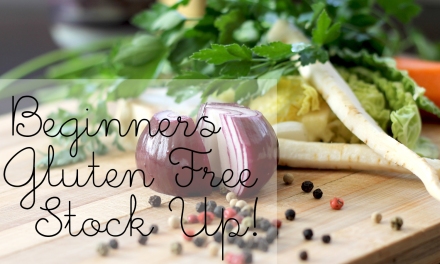Tomorrow I begin my adventure into a gluten free lifestyle. I’ve been doing a TON of research since I made my decision. I know it’s only been a couple days but I literally have been doing nothing but research. This post will be about stocking up for the beginning of a gluten free life, do’s and dont’s, and the benefits you will begin to see if you have gluten intolerance or celiac disease, or just want to try it out to see if it works for you!
What is “Gluten”?
Gluten is a substance found in wheat. It helps wheat based foods stay together and hold their shape. It is mostly found in wheat, rye, and barley. It sounds harmless, and it generally it is. But, more people than one may think have something called “celiac disease”. According to celiac.org:
“When people with celiac disease eat gluten (a protein found in wheat, rye and barley), their body mounts an immune response that attacks the small intestine. These attacks lead to damage on the villi, small fingerlike projections that line the small intestine, that promote nutrient absorption. When the villi get damaged, nutrients cannot be absorbed properly into the body.”
Read more at http://celiac.org/celiac-disease/what-is-celiac-disease/#Z7rEkMRZc7Ymdlk8.99
Gluten intolerance/sensitivity means that while one does not have celiac disease, their body still does not react “normally” to gluten.
How is this different from the Atkins diet? The Atkins diet is bull****. Sorry for being blunt, but it is. It promotes the elimination of carbohydrates, including fresh fruit, for the sake of weight loss, and any weight lost is usually just water weight. The gluten free diet promotes health for people who truly cannot process gluten. If you do not have celiac disease or gluten intolerance, there really aren’t any health benefits from this lifestyle.
I’m going to tell you right now, I have not been tested for celiac disease. But, I believe I may be sensitive to gluten. I have more than 50% of the symptoms related to gluten sensitivity. My adventure into a gluten free diet is more of a test: I want to see if things improve for me. If you believe your issues are more than just an intolerance, please see a doctor!
So what should you eat? Let’s stock up!
Produce: All fresh produce! Fruits and veggies are key.
Fats: “Good” fats, like olive and avocado oils, are recommended. Grassfed, organic butter is also highly recommended, but this can be very expensive. Kerrygold is a good starter butter and is usually affordable, especially when it’s on sale.
Meat: Try for fresh meat, poultry and fish. Stay away from anything “pre-made”, like those cuts that already have breading. Gluten could be lurking around. Try not to have anything too processed, like hot dogs. If it is prepackaged, read the labels.
Dairy: Cheese is usually okay, but with types like bleu cheese, gluten can be found in the mold. Check the labels on any milks or creams before purchase. Eggs are also key.
Snacks: Rice cakes, jerky, dried fruit, popcorn (plain, check the labels for flavored types), corn chips, nuts. There are tons of gluten free versions of favorite snacks, but they can be really expensive.
Grains and seeds: Quinoa, rice, chickpeas, sunflower seeds, flax, cornstarch.
Condiments: mustard, pickles, horseradish, some jams and jellies (check the labels!) olives, relish, honey, and some syrups.
Packaged and canned: Canned beans, canned fish (tuna and salmon), some organic soups, gluten free pasta, corn tortillas.
Herbs: Fresh herbs, or dried. Watch out for prepackaged herb mixtures, try to buy just the single dried herbs.
Drinks: Water, coffee, tea, organic fruit juices. Alcohol: ciders, wine.
Side note: I compiled this basic list as a beginner’s guide. Obviously, there is a lot more to this lifestyle and more creative recipes and foods to try. But I’m just starting out, and I don’t want to rush into such a huge lifestyle change. I like to go slowly. It’s less overwhelming 🙂
If you have celiac disease or gluten intolerance, within a few weeks you should begin to see improvements: gastrointestinal/digestive issues will begin to cease. Extreme fatigue will fade away, Keratosis Pilaris (chicken skin, harmless but I have it and it makes me so self conscious) will fade, brain fog fill fade. Dizziness and migraines will leave you alone. Mood swings and inflammation of joints should stop.
Do’s:
- Research.
- Read labels if unsure.
- Try to eat as “fresh” as possible.
- Be respectful. With any lifestyle, people are bound to question you and maybe even get defensive. Calmly explain it’s not a fad, it’s promoting your own personal health because of a disease or intolerance.
Don’ts
- Go to a restaurant and demand gluten free food. Most places do not have a gluten free menu, and a lot of servers and chefs may not know how to ensure what you’re eating. If you’re going out, look up the menu ahead of time to make sure there are options you know are safe.
- Boast. This is a personal health journey. Not everyone needs to be gluten free.
- Give into temptation. Think about how well your body is now responding. Something you miss may taste like heaven, but it’s not worth the pain. Stay strong, and remind yourself why you are doing this.
- Tell yourself that you’re giving up your favorite foods. You’re not giving anything up. You’re trading certain things in for better health.
I cannot stress this enough: This is a journey. There is much to learn, much to explore, and much to gain. I am beyond excited that I may have found a way to end my stomach issues, my constant fatigue, my painful and embarrassing skin issues, and my terrifying dizziness, mood swings, depression, and PMS. I’m also excited to record the journey here!
Be well, my friends!



Hope it works! #Thetrainer
LikeLike
Thanks!
LikeLike
Pingback: Five Days | Unless